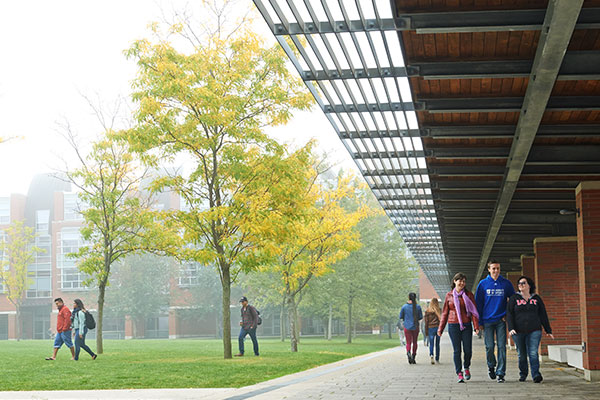Researchers receive new support to further studies in digital literacy, motor skills and hate crime
November 17, 2017

Research is at the heart of understanding the challenges and opportunities Canadians face in their daily lives. Evidence uncovered by research helps shape policies to improve our understanding of each other and our communities.
The Government of Canada, through the Social Sciences and Humanities Research Council (SSHRC), recently announced a $265 million investment in hundreds of social sciences and humanities research projects at post-secondary institutions across the country, including three projects at the University of Ontario Institute of Technology.
SSHRC Insight Grant projects
Janette Hughes, PhD
Canada Research Chair in Technology and Pedagogy
Professor, Faculty of Education
(co-investigator team includes Jennifer Laffier, PhD, Senior Lecturer, Faculty of Education)
- Making minds: digital maker education for literacies learning with marginalized youth
Beyond reading and writing, to be literate in an era of mass consumerism students need to be responsible consumers of digital texts and products. At the same time, educators must also emphasize the concept of digital ‘making’ or creation as a means of promoting such principles as inquiry, play, imagination and personalized learning. Students need help to develop important 21st-century competencies such as innovation, critical and creative thinking, problem solving, perseverance and collaboration.
The maker movement has typically been associated primarily with science, technology, engineering and math (STEM) or STEAM education (where there is a focus on embedding the arts, including literacy, into STEM). The research will investigate how to ensure students who live in poverty fully participate in the quickly evolving trend toward ‘maker’ teaching methodologies in formal education.
Meghann Lloyd, PhD
Associate Professor, Faculty of Health Sciences
Research Associate, Grandview Children's Centre
- Motor skill intervention for three-to-five-year-old children with autism spectrum disorder
Over the past several decades there has been a proliferation of interventions, treatments and so-called ‘miracle cures’ circulated for children with autism spectrum disorder (ASD). There is a critical need for evidence-based interventions for children with ASD.
This will be the first study using a rigorous research design, and a large sample size to investigate whether improving the motor skills of young children with ASD also improves social and communication skills, along with behavioural skills.
The results of this study will generate a much-needed first step in establishing the efficacy of a cost-effective, age-appropriate, and family-centred motor skill intervention for young children with ASD.
- Related link: 2017 Dr. Meghann Lloyd TEDx Talk ‘Learning to Move and Moving to Learn’
Insight Development Grant project
Barbara Perry, PhD
Professor, Faculty of Social Science and Humanities
- Policing hate crime in Canada: Identifying individual and organizational determinants
The recent emergence of hate crime as a distinct policy and legislative domain has presented challenges for police officers charged with responding to hate crime. However, there have been no attempts to understand the conditions shaping the development of police approaches to hate crime in Canada.
This project aims to assess whether and how police ‘see’ or recognize hate crime, whether and how they classify it, and what accounts for those decisions at the officer level and agency level. The proposal is for a pilot study in Ontario. The long-term goal is to conduct the research in the 50 Canadian cities with populations of more than 100,000.
Findings will:
- Provide awareness of the variations in police practice around hate crime at the organizational level and the individual level.
- Enable the identification of best practices to mobilize new knowledge and incorporate it into training initiatives, and in turn reaffirm community trust in policing.
Fast fact
- Dr. Perry recently received a SSHRC Connections grant to support the International Network for Hate Studies conference to be held at the University of Ontario Institute of Technology in May 2018.
Insight grant co-applicant funding
Isabel Pedersen, PhD
Canada Research Chair in Digital Life, Media and Culture
Associate Professor, Faculty of Social Science and Humanities
- Digital culture and quantified aging
Dr. Pedersen was a co-applicant on a Insight Grant awarded to lead researcher Dr. Barbara Marshall of Trent University in Peterborough, Ontario. Dr. Pedersen, Dr. Marshall and Trent’s Dr. Stephen Katz (second co-applicant) will examine age and age-related function with a focus on the ways that self-tracking technologies and digital apps are used to create new modes and styles of measuring, calculating, storing and sharing information about aging.
Quotes
“I want to commend the grant and scholarships recipients whose tireless efforts help us better understand our world and our relationships with each other. Our government is proud to support these talented researchers and scholars who are pushing the boundaries of knowledge to the benefit of Canadians and our growing middle class.”
—The Honourable Kirsty Duncan, Minister of Science
"All innovation is inherently social, which means the social sciences and humanities are especially important in this time of rapid change. SSHRC-funded scholars and researchers can provide guidance on important changes that are affecting society. Developing a vibrant and long-term culture of innovation in Canada is essential to building a bold and bright future for all Canadians."
—Ted Hewitt, President, Social Sciences and Humanities Research Council



